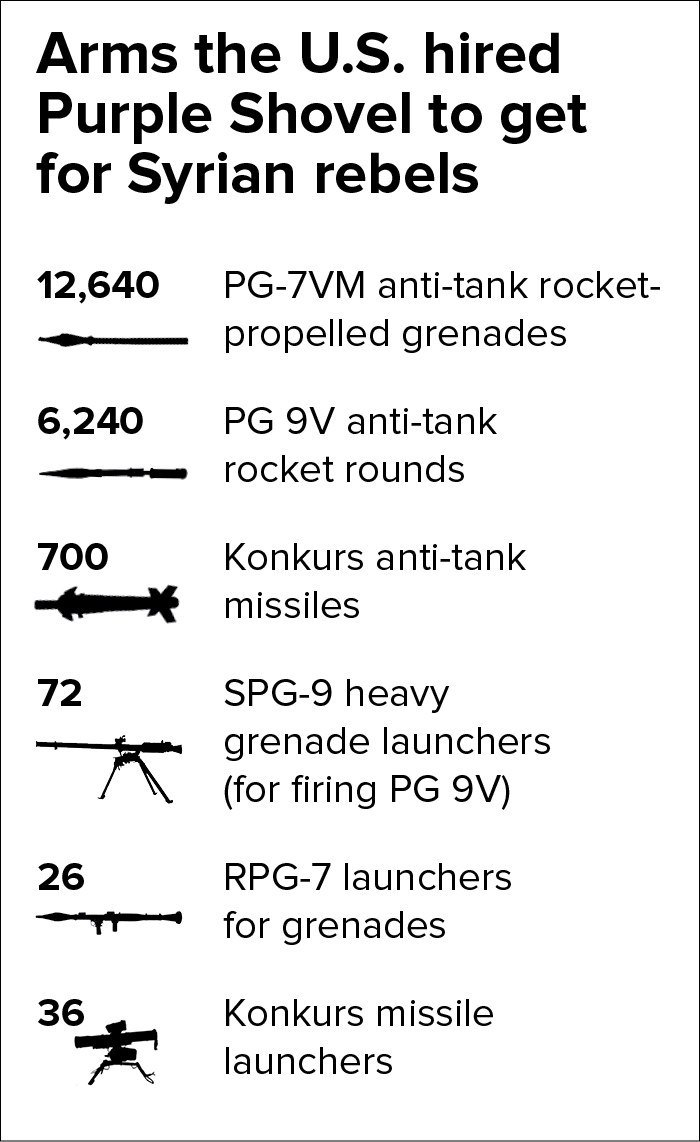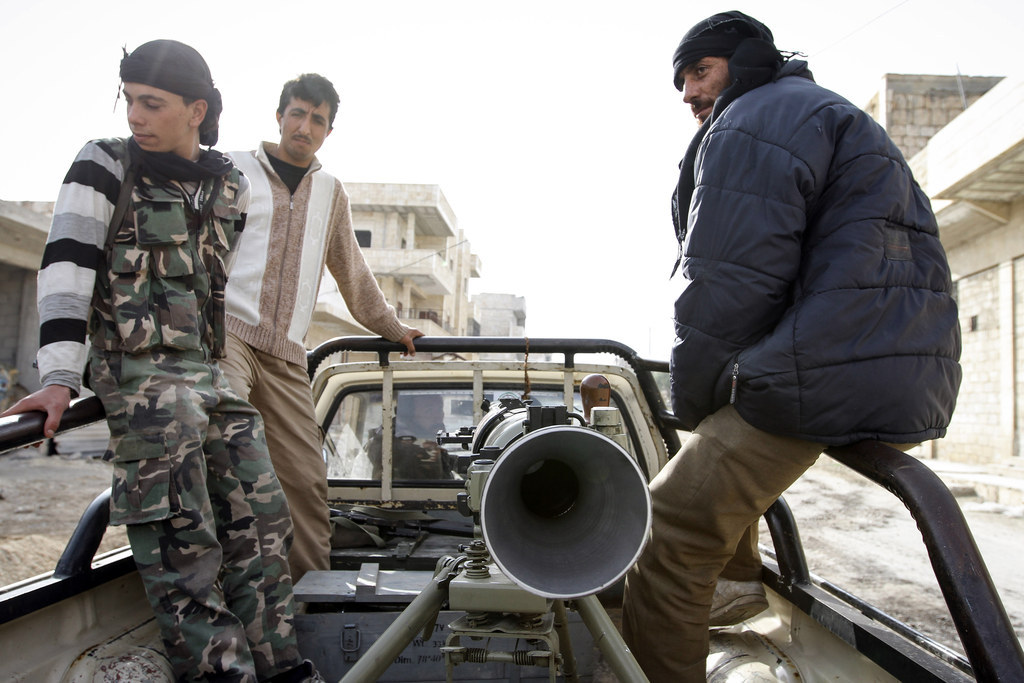
At the heart of the high-stakes U.S. program to train and equip Syrian rebels to fight ISIS is a multimillion-dollar arms deal that the Pentagon farmed out to a tiny, little-known private company called Purple Shovel LLC. A BuzzFeed News investigation, based on inside documents and confidential sources familiar with the Syria operation, has found:
▸ Purple Shovel, through the subcontractors it selected and oversaw, tried to sell the U.S. thousands of Russian-style rocket-propelled grenades that were considered unreliable because they were manufactured three decades ago, before Mikhail Gorbachev came to power in the Soviet Union.
▸ The U.S. government rejected them, and that delayed the effort to stand up the Syrian rebel force.
▸ An American contractor, 41-year-old Francis Norwillo, was killed in a weapons explosion in Bulgaria while training with such outdated grenades.
▸ The U.S. violated its own policy and gave Purple Shovel approval to acquire millions of dollars' worth of high-tech missiles for the rebels from Belarus, a dictatorship that is under sanctions by the European Union. Belarus, which has supplied weapons to Syrian President Bashar al-Assad's regime and is accused of human rights violations, is normally off-limits to U.S. arms dealers. But the U.S. military and State Department agreed to make an exception, allowing 700 powerful anti-tank missiles to be purchased, with U.S. taxpayer funds, for the rebels.
A Pentagon spokesperson defended its Train and Equip program in a statement to BuzzFeed News, saying, "We remain committed to expanding the New Syrian Forces and will continue to support those who we have trained." She said the arms "delivery issues" identified in this story did not "prevent" training, though she said she would "not comment on delivery schedules." A U.S. Special Operations Command spokesperson, Lt. Cmdr. Matthew Allen, acknowledged that the U.S. had acquired missiles from Belarus for the program.
A lawyer for Purple Shovel wrote that many of BuzzFeed News' findings are incorrect. She declined to provide details because she said the firm is barred by federal law from discussing its Defense Department contracts. Purple Shovel's CEO and founder, Benjamin Worrell, said in a brief telephone conversation, "I have absolutely no comment for you. I'm sorry."
Purple Shovel's arms contract is at the core of one of America's top international priorities: thwarting ISIS, the extremist group that has seized large regions of Syria and Iraq, beheaded many of its captives, and helped fuel the ongoing exodus of refugees from Syria. Last year, President Barack Obama gave a primetime televised speech from the White House, calling on Congress to approve his $500 million program to train and equip moderate Syrian rebels. The program was to recruit moderate Syrians, vet them to ensure they weren't infiltrators sent by ISIS or other groups, train them overtly using the U.S. military, and arm them. In December, Congress appropriated the funds.

Yet this July, eight months later, Secretary of Defense Ashton Carter testified that only 60 Syrians had been trained. Later, in a devastating blow, the Syrian commander trained by the Americans was captured along with some of his soldiers by Islamist rebels from the Jabhat al-Nusra group. And this week, the commander of Central Command, General Lloyd Austin, testified that only four or five of the U.S.-trained rebels were actually deployed and fighting ISIS.
While those fiascoes are known, the problems with Purple Shovel's multimillion-dollar arms contract have not been reported until now, and they show that troubles with the high-profile effort run deeper than previously realized.
They also illuminate the murky world of arms-dealing contractors behind many of America's efforts to prop up friendly fighting forces. The United States government is one of the biggest buyers of AK-47s and other Russian-designed weapons, pouring them into Iraq, Afghanistan, and other war-torn countries. The U.S. provides foreign weapons to groups it trains because fighters sometimes prefer them, because they can conceal U.S. links to an operation, and because they are inexpensive. As BuzzFeed News has reported, the Pentagon and the CIA sometimes use small, untested arms dealers to purchase the weapons.
A Tiny Firm Wins Big Contracts
Incorporated in Delaware in 2010, Purple Shovel was founded by Benjamin Worrell, who worked in Army counterintelligence from 1993 to 2001, according to military records. His company is designated as a Service-Disabled Veteran-Owned small business. His last assignment was with the 902nd Military Intelligence Group out of Fort Meade, Maryland. Military websites say the unit runs "full spectrum counterintelligence activities," which include "detecting, identifying, neutralizing and exploiting foreign intelligence services, international terrorist threats and insider threats."
From 2005 onward, according to his LinkedIn page, Worrell worked for the U.S. government and a series of contracting companies. He and his wife filed for personal bankruptcy in 2008, the year the financial crisis was cratering the economy. He reached an agreement with the bankruptcy court to discharge the debt, and federal court records show that his bankruptcy case was closed in July 2012. A Purple Shovel attorney, Margaret Carland, emailed that the bankruptcy was associated with medical costs and "is a private matter of no public news consideration."
Purple Shovel's big break came in December 2014, when it won two contracts totaling more than $50 million for the Syria program from the Special Operations Command, or SOCOM, which coordinates the activities of America's most elite military units.
When Purple Shovel was awarded those crucial contracts, according to a federal procurement database, the company had just six employees and annual revenue of less than $2 million.
One contract, for $23.5 million, was not for guns, but rather for training and equipment. Over time, the contract came to include things like "Arabic keyboards," and swelled to $31 million. Purple Shovel, records show, got this contract as a "sole source" award, meaning there was no competitive bidding — no other companies were able to try to get the work at a cheaper rate. Federal law typically discourages no-bid contracts, and the Pentagon declined to say why one was given in this case, though a federal procurement data system reported that it was because there was "only one source." Still, according to a performance review Purple Shovel shared with BuzzFeed News, the government gave the company a glowing review of its work on this contract, which was completed at the end of July, calling the work "exceptional."
The other big SOCOM contract was for approximately $26.7 million and was for "Foreign Weapons and Ammunition," according to the description. In this case, federal records say Purple Shovel won the contract in a competitive bid against two other companies. This contract eventually worked its way up to $28.3 million.
The equipment Purple Shovel and its subcontractors were supposed to buy for the Syrian rebels, according to documents and sources familiar with the procurement operation in Bulgaria, included 12,640 armor-piercing rocket-propelled grenades, of a type called the PG-7VM, along with hundreds of shoulder-mounted launchers. Then there were 6,240 even longer-range anti-tank grenades called PG-9Vs, which are fired from launchers called SPG-9s. (Insiders pronounce it "spig-nines.")

According to four sources with knowledge of the procurement, there was a huge problem with the effort to get the grenades. Purple Shovel's subcontractors managed to find rocket-propelled grenades made by a Bulgarian company, but they'd been manufactured in 1984 and sitting in warehouses longer than many soldiers had been alive. "1984 is way past its shelf life," one arms expert told BuzzFeed News, "unless it's been refurbished." But sources say these grenades had not been refurbished. The problem is that components can degrade, making the weapons either unstable, so they can blow up in a soldier's hand, or inert, so that soldiers can't fire the weapons, leaving them vulnerable in battle.
Three of those sources said that SOCOM turned down batches of the grenades that were supposed to be given to the rebels, because they were too old and unreliable. They say that slowed down the operation for the Syrian rebel effort.
SOCOM and the Pentagon didn't dispute that they rejected substandard equipment, but Cmdr. Elissa J. Smith, a Pentagon spokesperson, emailed BuzzFeed News, "I can tell you that the delivery issues did not prevent training from occurring."
Meanwhile, Bulgarian arms dealers with knowledge of the deal told BuzzFeed News they are being asked to find newly manufactured rocket-propelled grenades for SOCOM to fill the gap in the Syria program. New weapons are hard to procure, Bulgarian arms industry executives said, because due to the wars around the world, production for Russian-designed grenades and other weapons in Bulgaria and other Eastern European countries has reached capacity. The production lines are full.

Death Of A Contractor
On June 6, the news broke in Bulgaria of a mysterious explosion near the village of Anevo, at a rented arms range just a few miles from a medieval mountain fortress. One American contractor was killed and two were injured. Two Bulgarians were also injured.
Soon afterward, the U.S. Embassy in the Bulgarian capital Sofia released a statement revealing the name of the Purple Shovel and its connection to the Syria operation.
The defense contractors involved in this incident are employees of the company Purple Shovel, which has been awarded a contract by U.S. Special Operations Command, at the request of U.S. Central Command, to support the Combined Joint Interagency Task Force-Syria (CJIATF-S). CJIATF-S is the organization tasked to administer the Coalition Syria Train and Equip program.
BuzzFeed News has learned that the man who lost his life was Francis Norwillo, a 41-year-old Navy veteran who was an expert armorer. Sources close to his family say that after leaving the Navy, where he had worked with Navy SEALs, Norwillo joined the ranks of the private military-contracting world.

This spring, he was based in Texas and looking for work. Sources say he was hired by SkyBridge Tactical, a subcontractor to Purple Shovel. His job, according to friends and family members who asked that they not be named, was training. They say he told them he would be in Bulgaria for a week and a half. There, sources say, Norwillo was supposed to receive training meant to familiarize him with the rocket-propelled grenades so that he would be prepared to train American soldiers who would, in turn, train the Syrian rebels.
He was killed, according to five sources and Bulgarian news accounts, when he fired a grenade that was old, manufactured in 1984.
The family was told little about the cause of the accident. "All we know is a weapon went off and he got blown up," said Joe Norwillo, his father, in a phone interview from Texas. The Bulgarian government is conducting a probe, and the prosecutor's office there told BuzzFeed News that it will be completed in December.
In her statement to BuzzFeed News, Purple Shovel's lawyer wrote: "Mr. Norwillo's death was a tragic accident. All of the questions you ask here must be asked of the US Government or the subcontractor who oversaw his actions."
The SOCOM spokesperson, in an email, wrote that "we have not yet received an official report from the host government, which means we can't know with certainty what occurred at the time of the incident." Contradicting the U.S. Embassy statement, he added, "To the best of our knowledge, he was not supporting our contract when the incident took place."
U.S. authorities said there is no American investigation into Norwillo's death at this point.
SkyBridge Tactical, the subcontractor that employed Norwillo, declined to comment. The president, Stephen Rumbley, said that Norwillo's family had been upset by BuzzFeed News' calls: "If you hadn't talked to the family to upset them I would talk to you. Write your blog. Do your thing. I'm not going to talk to you."
Other companies were involved as subcontractors, according to sources and documents. Regulus Global, headquartered in Virginia, was Purple Shovel's primary procurement subcontractor. It, in turn, arranged to buy the grenades from a Bulgarian firm, Algans Ltd.
In a brief interview, Regulus Global's president, Lee Tolleson, said, "What we are doing for SOCOM is very good and very needed." He declined further comment. Algans could not be reached for comment, and the firm did not respond to an email with detailed questions.
U.S. Buys Weapons From A Dictator
In addition to the rocket-propelled grenades, Purple Shovel was also contracted to acquire 700 Russian-designed Konkurs missiles for the Syria mission. Those are anti-tank weapons, which are guided in flight by an attached wire, and they can hit and destroy a target at up to two and a half miles away. In theory, they could be used to blast the heavy armor that ISIS had acquired by conquering U.S.-equipped units of the Iraqi army that fled. Or they could hit the heavily armored construction vehicles that ISIS jerry-rigs to bust through fortified lines.
But there was a problem: finding them on the worldwide arms market. Bulgaria, the source for most of the weapons for the Syria operation, didn't have any. Ukraine is known to have some stored away but won't sell because it is in a shooting war with Russian-backed rebels.
A country that has plenty is Belarus. But that country, often called "Europe's last dictatorship," is usually considered off-limits for arms dealers who work with the United States. President Alexander Lukashenko, a close ally of Russian President Vladimir Putin, has ruled with an iron fist for 21 years, and he has been accused of repeatedly stealing elections and of "disappearing" political opponents. This year, a United Nations special rapporteur found that "the situation of human rights in Belarus has not improved, and that widespread disrespect for human rights, in particular civil and political rights, continues."

Ironically, along with Russia, Iran, and North Korea, Belarus was historically a major seller of arms to the Assad regime from 2006 to 2010, according to the Stockholm International Peace Research Institute, which tracks arms sales.
Belarus is on a special "International Traffic in Arms Regulations" list published by the U.S. State Department, of countries with bans or special restrictions. The State Department has to license almost every deal involving US companies, and arms dealers say they are almost always prohibited from buying weapons from Belarus, because it is on that list.
Still, Purple Shovel and its subcontractors turned to Belarus for the Konkurs missiles, according to five sources and SOCOM itself. Formally, the missiles would be acquired by Purple Shovel for SOCOM from a company in Bulgaria — but that company would get them from Belarus. Asked if it knew that the 700 Konkurs missiles specifically came from Belarus, the SOCOM spokesperson answered, "Yes. USSOCOM is required to know all sources of equipment procured for use." SOCOM and the Office of the Secretary of Defense would not provide further comment on the issue. The U.S. State Department, which licenses private arms deals, also signed off on the transaction, sources say. The State Department declined to comment.
An official at the Military Industrial Committee of the Republic of Belarus, which coordinates military exports, told BuzzFeed News to send questions by email, but a subsequent email received no response.
At the Purple Shovel headquarters in at an office park in Sterling, Virginia, there's a Purple Shovel logo on the mirrored front door. It shows a globe, a shovel formed from the letter "P," and the words "Around the world, Around the clock." Earlier this month, no one responded to repeated knocks on the door.

